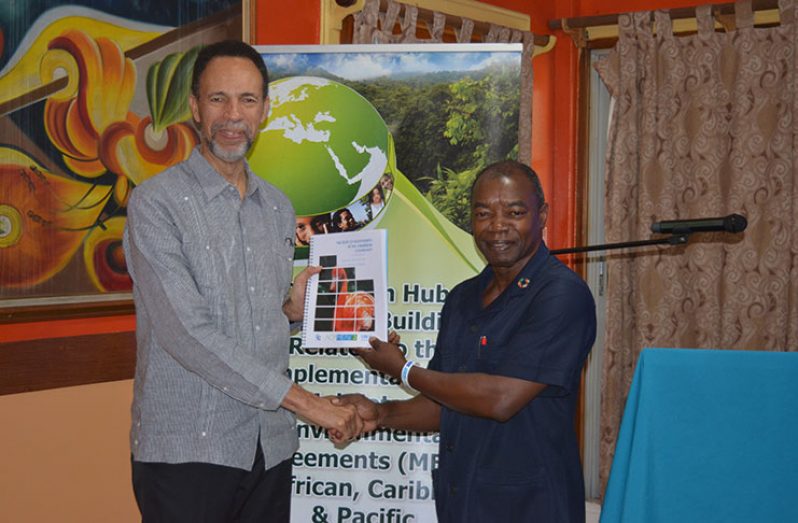– with a 1.5-degree rise in temperature – IPPC study
A RECENTLY released Inter-Governmental Panel on Climate Change (IPCC) study shows that a 1.5-degree rise in temperature could have a disastrous effect on the Caribbean.
This is according to CARICOM Assistant Secretary-General (ASG) for Foreign and Community Relations, Ambassador Colin Granderson. Ambassador Granderson was at the time addressing the Caribbean Regional Preparatory Workshop for the 14th Conference of the Parties (CoP) for the Convention on Biological Diversity (CBD) and Regional Consultation.
The event was held on Wednesday at the Grand Coastal Hotel, East Coast Demerara.
The diplomat said such rise in temperature supports the concern of the 38 UN- recognised Small Island Developing States, which includes 14 CARICOM member countries.
“Our very existence will be threatened by a 1.5-degree rise, much less a 2-degree temperature rise,” he said.
The ambassador explained that since 2012, the CARICOM Secretariat has been supporting member states in preparations for negotiations on the Convention on Biological Diversity (CBD), the Nagoya Protocol on Access and Benefit-Sharing, and the Cartagena Protocol on Biosafety.
“This is the third such regional preparation for negotiations of the Convention on Biological Diversity and its protocols. These preparatory sessions are undertaken as an important deliverable of the Project for Capacity-Building Related to Multilateral Environmental Agreements in African, Caribbean and Pacific countries (the ACP-MEAs project),” the ASG said.
He explained that two other important outputs of the ACP- MEAs Project include the publication of “The State of Biodiversity in the Caribbean – A review of progress towards the Aichi biodiversity targets” and the development of a draft Caribbean Biodiversity Strategy.
Ambassador Granderson said preparation of the State of Biodiversity Report was a unified effort among the CARICOM Secretariat, the UN Environment Programme (UNEP), CARICOM member states and regional biodiversity experts.
“The draft Caribbean Biodiversity Strategy has been prepared by Regional Consultants CANARI, and we are hoping to have a Draft Final Document by 30 November, 2018. We are going to lean on this gathering of regional experts to examine the strategy within the context of national priorities and obligations to the relevant MEAs,” the CARICOM envoy said.
Adding that the secretariat will submit the Caribbean Biodiversity Strategy to the next meeting of the COTED, the ambassador said COTED shall have the opportunity to advise on the post-2020 biodiversity priorities for the Region.
“It will also afford an opportunity to link the biodiversity strategy to the COTED- mandated Caribbean Community Natural Resources Policy Framework, which is in draft, as well as to the SIDS agenda and the 2030 Sustainable Development Agenda,” he noted.
He added that the ACP MEAs Phase II project is scheduled to come to an end in December 2018 and a third phase of the project is under negotiation between the European Commission, the ACP and UNEP.
“The CARICOM Secretariat is therefore seeking guidance from member states based on national and overarching regional priorities and needs to be included in the Phase III project,” he said
Further, he said the secretariat is also asking that in developing and proposing interventions, participants must ensure that they build inclusiveness and engage the major groups: women, young children, farmers, fishers, academia and the business community.
“Your role as regional biodiversity experts is critical in this regard. CARICOM countries are, and have been historically, heavily dependent on their natural resources in their economic constructs,” he told the gathering at the workshop.
“Future economic development will depend on timely adaptation strategies and sound management of natural resources. Building resilience will also require prudent management, since healthy ecosystems improve a country’s ability to bounce back from catastrophic events.”
The meeting will also serve as a brainstorming session for Phase Three of the ACP Multilateral Environmental Agreements Project.




.jpg)









